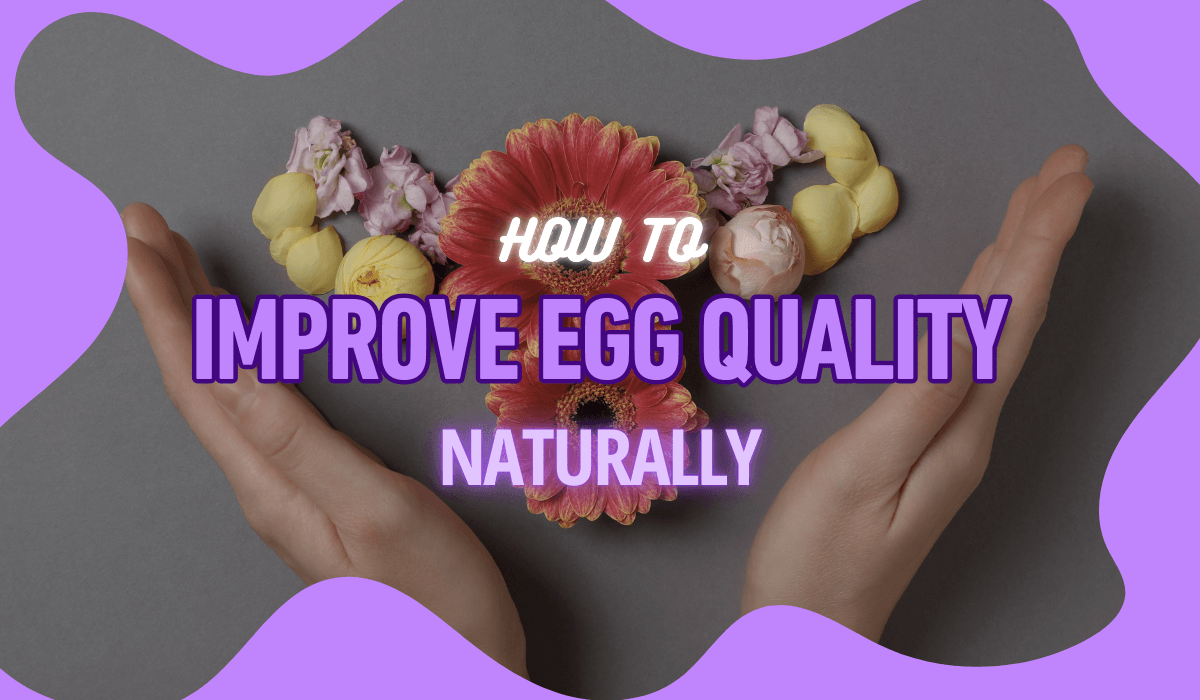"So, You’re Telling Me My Eggs Have an Expiration Date?"
When I first started trying for a baby, I didn’t really think about egg quality. I mean, sure, I knew that eggs were involved in this whole making-a-baby process, but I kind of assumed that as long as I ovulated, things were fine.
Then, after months of nothing happening, I fell into the TTC rabbit hole. And suddenly, I was learning about egg health, oxidative stress, mitochondrial function (what?), and the dreaded phrase—“your eggs age just like you do.”
Cue the panic.
That’s when I decided to do everything I could to give my eggs the best chance possible. I started eating healthier, tried to manage stress (lol, trying to conceive is the opposite of stress-free), and added some key supplements to my routine.
Did it magically fix everything overnight? Nope. But did I feel like I was actually helping my body instead of just waiting and hoping? Absolutely.
So, if you’re in the same boat, wondering how to boost your egg quality without losing your mind, here’s what actually works.
Why Egg Quality Matters
💡 Egg quantity vs. egg quality: You’re born with all the eggs you’ll ever have, but quality is what actually determines whether an egg can turn into a healthy baby. Even if you have lots of eggs, if they’re not healthy, they won’t fertilize properly or lead to a viable pregnancy.
As we age, egg quality naturally declines (thanks, biology), but the good news? Lifestyle changes and certain nutrients can help protect and even improve the quality of the eggs you already have.
How to Improve Egg Quality Naturally
1. Focus on an Antioxidant-Rich Diet
Oxidative stress damages eggs over time, so antioxidants are your best friend.
✔️ Eat more of:
- Berries, spinach, kale, broccoli (hello, vitamin C & E)
- Nuts, seeds, and fatty fish (omega-3s for healthy cell function)
- Dark chocolate (yes, really—just go for the high-quality kind!)
🙋♀️ My experience: I swapped out some junk food for more whole foods and started making smoothies with berries, spinach, and chia seeds. (Bonus: It actually tasted good.)
2. Reduce Sugar & Processed Foods
Blood sugar imbalances mess with your hormones and inflammation, which isn’t great for egg quality.
✔️ Try:
- Cutting back on refined sugar & white carbs
- Choosing whole grains over processed ones
- Balancing meals with protein, fiber, and healthy fats
🙋♀️ My experience: I didn’t go crazy strict, but I tried to be more mindful—like swapping white bread for whole-grain and cutting back on sweets. (Did I still eat cake sometimes? Absolutely.)
3. Take Fertility-Supporting Supplements
Certain nutrients have been shown to protect eggs from damage and improve mitochondrial function (basically, keeping your eggs’ energy levels strong).
✔️ Popular supplements for egg quality:
- CoQ10 (Ubiquinol) – Helps with egg energy & quality
- Vitamin D – Supports overall reproductive health
- Omega-3s – Reduces inflammation
- Folate (Methylfolate, Not Folic Acid!) – Essential for cell development
- NAC & Myo-Inositol – Great for women with PCOS or irregular cycles
🙋♀️ My experience: I started with CoQ10 and omega-3s because those were the most recommended, and honestly? I wish I had started earlier.
4. Manage Stress (As Much as Possible)
Stress releases cortisol, which can throw off your hormones and impact egg quality. And if you’ve been TTC for a while, you know that "just relax and it’ll happen" is the worst advice ever.
✔️ What actually helps:
- Daily walks & fresh air
- Meditation & breathing exercises
- Acupuncture (if you’re open to it!)
- Cutting back on doomscrolling TTC forums (been there, done that)
🙋♀️ My experience: I started morning meditation and breathwork, and while it didn’t instantly solve my fertility issues, it helped me feel way less like a stressed-out mess.
5. Prioritize Sleep
Your eggs do their best repair work while you sleep. If you’re running on fumes, your body won’t prioritize reproductive health.
✔️ Try:
- Aiming for 7-9 hours of sleep per night
- Avoiding screens before bed (blue light messes with melatonin, which is important for egg health!)
- Creating a bedtime routine (reading, stretching, herbal tea)
🙋♀️ My experience: I used to stay up late watching Netflix, but when I started focusing on better sleep, I noticed my cycles felt more regular.
6. Avoid Toxins That Harm Egg Health
We’re exposed to hormone-disrupting chemicals daily, and while we can’t avoid everything, we can reduce exposure.
✔️ Biggest culprits:
- BPA (in plastics & receipts)
- Pesticides (on non-organic produce)
- Harsh chemicals (in skincare & cleaning products)
🙋♀️ My experience: I switched to a BPA-free water bottle and swapped some of my skincare products for cleaner options. Easy changes, but worth it.
Final Thoughts
Egg quality isn’t something we think about—until suddenly, it’s all we think about. While we can’t turn back time, we can support our eggs by giving them the best environment possible.
Does eating more spinach and taking CoQ10 guarantee pregnancy? No. But making small, consistent changes stacks the odds in your favor.
So, if you’re on this journey and trying to do everything you can to help your body, you’re not alone. Take care of yourself, stay consistent, and most importantly—give yourself grace.
💬 Have you tried any of these changes for egg quality? What worked for you? Drop a comment below!
👉 Want a free fertility nutrition guide? Grab yours here: TTC Freebies


